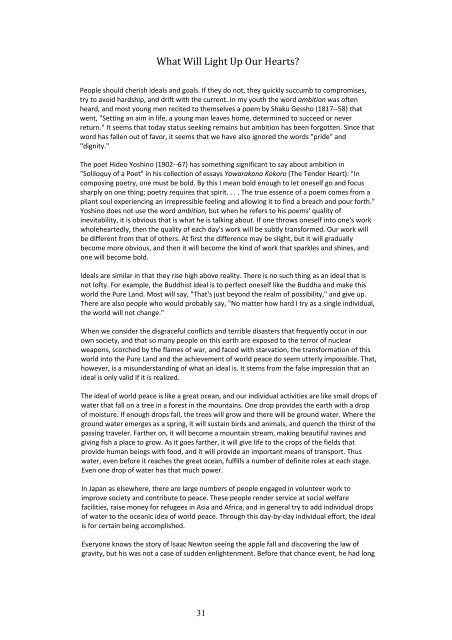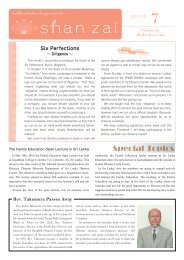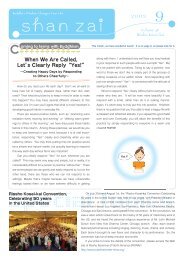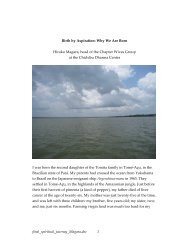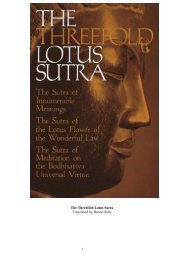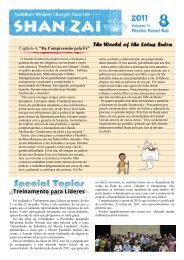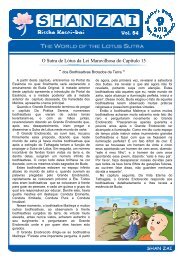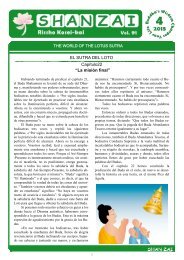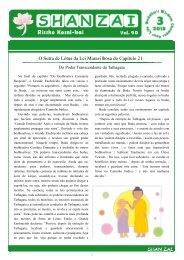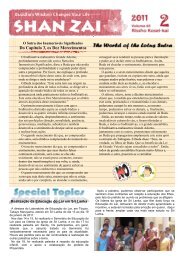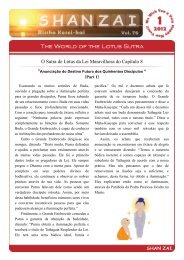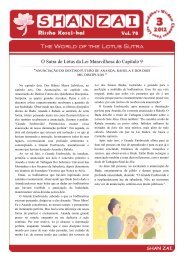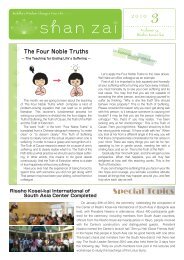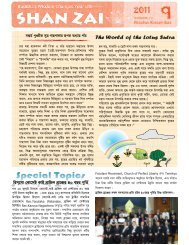Everyone has some ability that is beyond <strong>the</strong> ordinary. There may be some who lament that<strong>the</strong>y do not, but <strong>the</strong>y are mistaken. The simple fact is that <strong>the</strong>y have not developed <strong>the</strong>irpotential.In <strong>the</strong> Buddha's time <strong>the</strong>re was in India a powerful kingdom called Kosala. Its queen, Mallika,was of common origin, and as a young girl she worked in a flower garden where hair ornamentswere made. One day while Pasenadi, <strong>the</strong> young king of Kosala, was walking in <strong>the</strong> garden, hehappened <strong>to</strong> notice Mallika and asked her for water <strong>to</strong> rinse his feet. The lukewarm water shebrought soo<strong>the</strong>d his feet. The king <strong>the</strong>n asked for water <strong>to</strong> wash his face. This time she broughtwater that was slightly cool, and it felt very refreshing on his face. Increasingly delighted, <strong>the</strong>king <strong>the</strong>n asked for water <strong>to</strong> quench his thirst. The water that Mallika brought <strong>to</strong> him was verycold, and pleasing <strong>to</strong> <strong>the</strong> throat. When <strong>the</strong> king inquired in<strong>to</strong> <strong>the</strong> matter, she replied, "Thewater for your feet was from <strong>the</strong> surface of <strong>the</strong> spring, warmed by <strong>the</strong> sun's rays. The water foryour face was from lower down, and <strong>the</strong> water for you <strong>to</strong> drink was from <strong>the</strong> depths." The kingpromptly decided that she was just <strong>the</strong> one <strong>to</strong> be his wife, and he <strong>to</strong>ok her <strong>to</strong> his castle andmade her queen of Kosala.Everyone knows that <strong>the</strong> temperature of a body of water varies according <strong>to</strong> <strong>the</strong> depth, bu<strong>to</strong>nly someone unusually considerate would use that knowledge <strong>to</strong> please someone. BecauseMallika was that kind of person, she found unexpected happiness.Shigenobu Okuma (1838‐‐1922), <strong>the</strong> founder of Waseda University in Tokyo and twice primeminister of Japan, is said <strong>to</strong> have had poor handwriting. When he was young his calligraphyteacher was a useless drunkard and did not teach his pupil well, and Okuma <strong>to</strong>ok a dislike <strong>to</strong>writing. He completed his studies at <strong>the</strong> Saga fief school, <strong>the</strong> Kodokan, and went on <strong>to</strong> a schoolof <strong>the</strong> Dutch and English languages in Nagasaki. He so disliked writing that he <strong>to</strong>ok no notes of<strong>the</strong> lectures, but instead did his best <strong>to</strong> remember <strong>the</strong>m. This streng<strong>the</strong>ned his memory, andlater as a politician he never forgot even <strong>the</strong> most complicated discussion. This is an example ofa man who developed his skill through his own efforts.Ano<strong>the</strong>r example is of Kiyoshi Ichimura (1900‐‐1968), <strong>the</strong> founder of <strong>the</strong> Ricoh‐San‐Aiconglomerate, known as an "idea president" and a master of management. Shortly after WorldWar II, several years after he started out in business, he spotted a large plot of vacant land in<strong>the</strong> Ginza district of central Tokyo, and repeatedly asked <strong>the</strong> elderly woman who owned it <strong>to</strong>sell it <strong>to</strong> him, but she always refused, saying she could not part with land that had always beenin her family. Undaunted, Ichimura continued <strong>to</strong> call on her. Deciding <strong>to</strong> refuse him once andfor all, she went <strong>to</strong> call on him at his office. The day was cold and sleeting. When she arrived at<strong>the</strong> office, a young female employee greeted her with a smile and politely offered her slippers<strong>to</strong> change in<strong>to</strong>. These were ordinary courtesies. But <strong>the</strong> young woman also <strong>to</strong>ok out herhandkerchief and wiped <strong>the</strong> hem of <strong>the</strong> older woman's kimono, which was wet from <strong>the</strong> sleet.The old woman was impressed by such thoughtfulness and decided that she liked <strong>the</strong> kind ofcompany that would hire such employees. She changed her mind on <strong>the</strong> spot and <strong>to</strong>ld Ichimurashe would sell him <strong>the</strong> land. The young woman was unusually considerate. Her kindness and<strong>the</strong> way in which she received visi<strong>to</strong>rs contributed greatly <strong>to</strong> <strong>the</strong> company's future.Knowing and developing your own special talent will give you confidence and a sense ofstrength.30
What Will Light Up Our Hearts?People should cherish ideals and goals. If <strong>the</strong>y do not, <strong>the</strong>y quickly succumb <strong>to</strong> compromises,try <strong>to</strong> avoid hardship, and drift with <strong>the</strong> current. In my youth <strong>the</strong> word ambition was oftenheard, and most young men recited <strong>to</strong> <strong>the</strong>mselves a poem by Shaku Gessho (1817‐‐58) thatwent, "Setting an aim in life, a young man leaves home, determined <strong>to</strong> succeed or neverreturn." It seems that <strong>to</strong>day status seeking remains but ambition has been forgotten. Since thatword has fallen out of favor, it seems that we have also ignored <strong>the</strong> words "pride" and"dignity."The poet Hideo Yoshino (1902‐‐67) has something significant <strong>to</strong> say about ambition in"Soliloquy of a Poet" in his collection of essays Yawarakana Kokoro (The Tender Heart): "Incomposing poetry, one must be bold. By this I mean bold enough <strong>to</strong> let oneself go and focussharply on one thing; poetry requires that spirit. . . . The true essence of a poem comes from apliant soul experiencing an irrepressible feeling and allowing it <strong>to</strong> find a breach and pour forth."Yoshino does not use <strong>the</strong> word ambition, but when he refers <strong>to</strong> his poems' quality ofinevitability, it is obvious that is what he is talking about. If one throws oneself in<strong>to</strong> one's workwholeheartedly, <strong>the</strong>n <strong>the</strong> quality of each day's work will be subtly transformed. Our work willbe different from that of o<strong>the</strong>rs. At first <strong>the</strong> difference may be slight, but it will graduallybecome more obvious, and <strong>the</strong>n it will become <strong>the</strong> kind of work that sparkles and shines, andone will become bold.Ideals are similar in that <strong>the</strong>y rise high above reality. There is no such thing as an ideal that isnot lofty. For example, <strong>the</strong> Buddhist ideal is <strong>to</strong> perfect oneself like <strong>the</strong> Buddha and make thisworld <strong>the</strong> Pure Land. Most will say, "That's just beyond <strong>the</strong> realm of possibility," and give up.There are also people who would probably say, "No matter how hard I try as a single individual,<strong>the</strong> world will not change."When we consider <strong>the</strong> disgraceful conflicts and terrible disasters that frequently occur in ourown society, and that so many people on this earth are exposed <strong>to</strong> <strong>the</strong> terror of nuclearweapons, scorched by <strong>the</strong> flames of war, and faced with starvation, <strong>the</strong> transformation of thisworld in<strong>to</strong> <strong>the</strong> Pure Land and <strong>the</strong> achievement of world peace do seem utterly impossible. That,however, is a misunderstanding of what an ideal is. It stems from <strong>the</strong> false impression that anideal is only valid if it is realized.The ideal of world peace is like a great ocean, and our individual activities are like small drops ofwater that fall on a tree in a forest in <strong>the</strong> mountains. One drop provides <strong>the</strong> earth with a dropof moisture. If enough drops fall, <strong>the</strong> trees will grow and <strong>the</strong>re will be ground water. Where <strong>the</strong>ground water emerges as a spring, it will sustain birds and animals, and quench <strong>the</strong> thirst of <strong>the</strong>passing traveler. Far<strong>the</strong>r on, it will become a mountain stream, making beautiful ravines andgiving fish a place <strong>to</strong> grow. As it goes far<strong>the</strong>r, it will give life <strong>to</strong> <strong>the</strong> crops of <strong>the</strong> fields thatprovide human beings with food, and it will provide an important means of transport. Thuswater, even before it reaches <strong>the</strong> great ocean, fulfills a number of definite roles at each stage.Even one drop of water has that much power.In Japan as elsewhere, <strong>the</strong>re are large numbers of people engaged in volunteer work <strong>to</strong>improve society and contribute <strong>to</strong> peace. These people render service at social welfarefacilities, raise money for refugees in Asia and Africa, and in general try <strong>to</strong> add individual dropsof water <strong>to</strong> <strong>the</strong> oceanic idea of world peace. Through this day‐by‐day individual effort, <strong>the</strong> idealis for certain being accomplished.Everyone knows <strong>the</strong> s<strong>to</strong>ry of Isaac New<strong>to</strong>n seeing <strong>the</strong> apple fall and discovering <strong>the</strong> law ofgravity, but his was not a case of sudden enlightenment. Before that chance event, he had long31
- Page 1 and 2: Invisible EyelashesSeeing What is C
- Page 3 and 4: THE TWO FUNCTIONS OF A CELL 55The P
- Page 5 and 6: For this to take place, it is vital
- Page 7 and 8: Pleasure is filling the empty rice
- Page 9 and 10: Rose or Thorns?The rose is beautifu
- Page 11 and 12: The Contents of Hotei's SackThe mor
- Page 13 and 14: GratitudeFor the past two decades I
- Page 15 and 16: Looking Into the DepthsEach of us m
- Page 17 and 18: Self‐AwarenessSometimes we allow
- Page 20 and 21: the mountains, Po Chu‐i went to m
- Page 22 and 23: and hesitating to take a first step
- Page 24 and 25: "Nothing has an ego" means that all
- Page 26 and 27: self‐love, endeavoring to develop
- Page 28 and 29: ampant, Dr. Schweitzer devoted his
- Page 32 and 33: een pondering Kepler's theories of
- Page 34 and 35: improved, I would return home only
- Page 36 and 37: work.In another section, "The Daily
- Page 38 and 39: Hakone, I finished in fifty‐five
- Page 40 and 41: Many people want to work in their o
- Page 42 and 43: eplied, "One hundred divided by two
- Page 44 and 45: at the gate, the Buddha appeared an
- Page 46 and 47: once again sinks into despair, it t
- Page 48 and 49: individuality grows beyond the boun
- Page 50 and 51: this truth, one becomes keenly awar
- Page 52 and 53: suddenly turned irritable and said,
- Page 54 and 55: well in a sport, one obeys the rule
- Page 56 and 57: There is, however, one infallible r
- Page 58 and 59: The offering of kind words means sp
- Page 60 and 61: We must never think of ourselves an
- Page 62 and 63: The Wind Blowing from the FutureThe
- Page 64 and 65: Courage That Opens DoorsI have many
- Page 66 and 67: "Even Insects Work and Eat"My paren
- Page 68 and 69: Home Is More Than a HavenIn recent
- Page 70 and 71: Where Affection and Gratitude Begin
- Page 72 and 73: Forever Young at HeartAlmost every


